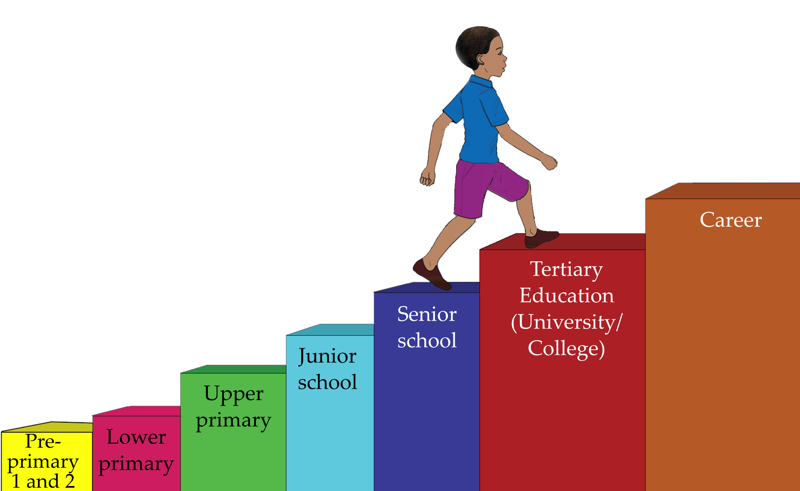Factors to consider in the selection of a pathway
Think and share
- What would you like to be when you grow up?
- What is the meaning of the term career path?
Activity 1: Work in pairs
A career path is a journey that leads to attaining knowledge, skills, values and positive attitude that prepares one for work (a specific job or career) after completing school. The following illustration summarises a career path. Study it and answer the questions that follow.

- Which subjects did you enjoy the most in lower primary?
- Did your interests and favourite subjects change as you moved from lower primary to upper primary? Explain your response.
- What are your favourite subjects now? How do they relate to your future career goals?
Career path | ||
Social Sciences | Arts and Sports | Science Technology Engineering and Mathematics (STEM) |
- Match each description to its career pathway.
- This pathway contains four disciplines which provide a solid grounding in fundamental scientific principles, technical competencies and applied problem-solving skills. Learners in this track can pursue careers in areas such as pharmacy, engineering, medicine and technology.
- This pathway aims to cultivate creativity and physical prowess. It caters to learners interested in careers such as aerobics, athletics, music, acting, photography and art.
- This is a branch of science that studies society and the relationships of individuals within a society. It involves the study of society and the manner in which people behave and relate with others. This pathway paves way for careers such as linguistics, geology, law, political science, psychology, economics and commerce.
- Brainstorm on the pathways that can lead to the following careers.
- Archaeology
- Athletics
- Medicine
Activity 3: Work in groups
Study the pictures below and answer the questions.
- Which career pathway is each learner likely to take?
- Which factors will each learner consider when deciding the pathway they would like to pursue in senior school?
- Which other factors would you consider when selecting a career pathway?
- Write down your:
- Talents
- Abilities
- Passion and interests
- Which career pathway would you like to pursue in senior school?
- How does the pathway you would like to pursue suit or fit into your talents, abilities passions and interests?
Activity 4: Work in groups
- Your teacher will invite a resource person to discuss factors to consider in the selection of a career pathway.
- Write down key points.
- Engage in the discussion by asking questions to enhance your understanding. You may ask the following questions:
- How can I determine if a career aligns with my talents, abilities, interests and passions?
- What steps can I take now to prepare for my chosen career pathway?
- What advice would you give to someone who is undecided between two career pathways?
- Interview your parents or guardians about their career paths.
- Find out the factors they considered when choosing their careers or jobs.
- Share your findings in class.
Notes Corner
The following are factors to consider when selecting a career pathway:
- Talents, interests and passions: Think about the activities that you are really good at and enjoy doing. Choose a career pathway that aligns with the activities.
- Skills and abilities: Consider the skills and abilities you have developed. Evaluate how your skills and abilities align with the requirements of different career pathways.
- Personal fulfillment: Choosing a career pathway that aligns with your personal values and interests can lead to satisfaction. Think about what matters most to you such as creativity, helping others or innovation.
- Academic strengths: Reflect on the subjects you enjoy or excel in. Some careers may require you to be good at certain subjects, therefore, this can help you figure out what might be a good fit.
Requirements for Social Sciences pathway in senior school
Social Sciences Tracks | Languages Track |
Humanities Track |
- Sort the learning areas that follow in the appropriate Social Science track.
- Indigenous Languages
- Kenyan Sign Language
- Hindu Religious Education
- History and Citizenship
- Lugha ya Kiswahili
- Geography
- Fasihi ya Kiswahili
- Islamic Religious Education
- Arabic
- French
- Christian Religious Education
- English Language
- Mandarin
- German
- Literature in English
- What are the requirements of the tracks in the Social Sciences pathway?
- Share your work with your classmates.
Activity 6: Class activity
Your teacher will invite a resource person to discuss the requirements for Social Sciences pathway in senior school.
- Listen keenly and write down notes.
- Using the information obtained from the resource person, answer the questions that follow:
- Which career opportunities can stem from pursuing the Social Sciences pathway in senior school?
- Which skills are essential for success in Social Sciences careers?
- How can you develop the skills you listed in question 2(b) during your studies in the Social Sciences pathway?
- Create and draw charts on the requirements for the Social Sciences pathway in senior school.
- Display your posters in class.
Notes Corner
The requirements of the Social Sciences pathway include the following:
- Maintain a satisfactory academic performance in subjects relevant to the Social Sciences pathway.
- Actively engage in class discussions, projects and activities related to Social Sciences to demonstrate interest and commitment to the pathway.
- Skills such as problem‑solving, communication, critical thinking and decision making, among others.
Choosing a possible track within a pathway at senior school
Activity 7: Work individually
Study the chart below. Answer the questions that follow.
Career pathways | ||
Arts and Sports Science | Social Sciences | Science, Technology, Engineering and Mathematics (STEM) |
Tracks Sports Sciences Performing Arts Visual and Applied Arts | Tracks Languages and Literature Humanities | Tracks Applied Sciences Pure Sciences Technical and engineering Careers and Technology Studies |
- Which career pathway would you like to pursue? Explain your response.
- Which track within the career pathway you chose in question 1, would you like to pursue in senior school? Explain your reasons.
- Share any of your talents, abilities, passions or interests that align with the track that you chose in question 2.
- Share your work with your classmates.
Activity 8: Work in groups
Read Mukwhana’s journal entry.
Date: 7th June 2024 Today, I made a big decision about my future. I have chosen the Arts and Sports Sciences pathway, particularly, the Sports Science track because I am passionate about athletics and dream of becoming a world‑class marathon athlete like Eliud Kipchoge. As the current record holder for the marathon in my County, running is not just a hobby for me, it is my passion and talent. I want to take my skills to the next level. I will pursue the following subjects Home Science, Sports Ethics, Athletics, Business Studies, English language and Religious Education. This is because they will help me to gain knowledge about different techniques applied in athletics such as injury prevention and ways to stay fit and healthy living. They will also help me to understand what it takes to be a successful professional athlete. When I excel in the Sports Science track, I will pursue careers such as athletics, sports coaching, sports nutrition, fitness instructor, kinesiologist, Physical and Health Education teacher, sports manager, sports researcher and physiotherapy. Choosing this track feels like the first step towards achieving my dreams. I cannot wait to see where this journey takes me. |
- Why did Mukhwana choose the Sports Sciences track?
- What have you learnt from Mukhwana's journal entry?
- Select your track from any of the pathways and mention the subjects you will pursue.
- Mention careers you can pursue after studying the pathway you chose in question 3.
Activity 9: Work individually
- Journal about the track you chose to pursue in senior school. Your journal entry should include the following information:
- What inspired you to choose this particular track?
- How will the career track help you to achieve your career goals?
- What aspects of this track excite you the most?
- How do your talents and interests align with the track?
- How do you hope to grow and develop personally and academically through this track?
- Share your journal entry with your friend.
Activity 10: Work individually
- Create a vision board that represents your career goals and the steps you need to take to achieve them.
- Cut out images, quotes or words from the magazines or newspapers that represent your career goals. You may also write the quotes, draw or print and download pictures to add to your vision board.
- Think big when creating the vision board, do not limit yourself.
- Present your vision board to the class. Explain the images and words you chose and how they represent your career goals.
Activity 11: Work individually
You have decided on the pathway you would like to pursue in senior school. This is important because it helps to plan for your future career goals. Discuss why it was important to plan for your future career. You may use the following questions to guide your discussion:
- How does visualising your goals motivate you to work hard?
- How can planning help you to achieve your goals?
- What skills do you need to develop to be successful in your desired career?
- How can you start building the skills you listed in question 3?
Activity 12: Work in pairs
Recite the following poem.
Each choice we make, a step we take,
In choosing pathways, our futures awake,
STEM, where science sparks the light,
Social Sciences brings understanding to light.
Arts, where creativity takes flight,
Sports Science, where athletes ignite,
Choose your path, let dreams take hold,
In Senior School, where paths unfold.
- Compose a poem on pathway choices.
- Recite the poem during school events.
Notes Corner
It is important to learn about career pathways because:
- Knowledge of career pathways empowers us to make informed decisions about our future careers.
- Learning about career pathways enables us to prepare ourselves for the requirements and demands of our chosen fields, whether through education, training or gaining relevant skills and experience.
- Understanding different career pathways helps us to identify our interests, strengths and aspirations. This provides direction on the career to pursue in future.
The following are importance of choosing a possible track within a pathway:
- It helps us to focus on the subjects we are interested in.
- By choosing a track that aligns with our interests, talents and career goals, we can ensure that our education remains relevant and meaningful to our future career dreams.
- Choosing a specific track within a pathway allows us to tailor our education to meet the requirements and demands of the chosen field or profession.
Assess your progress
-
- Complete the following.
Career pathway | Arts and Sports Science |
(STEM) |
- Mark the tracks in the Social Sciences pathway.
- Languages
- Literature
- Humanities
- Pure Sciences
- Performing Arts
- Engineering
- You want to choose a pathway that you will pursue in senior school. Which factors will you consider in the selection of a pathway?
- Which track do you want to pursue in senior school?
- Why is it important to learn about career pathways?




